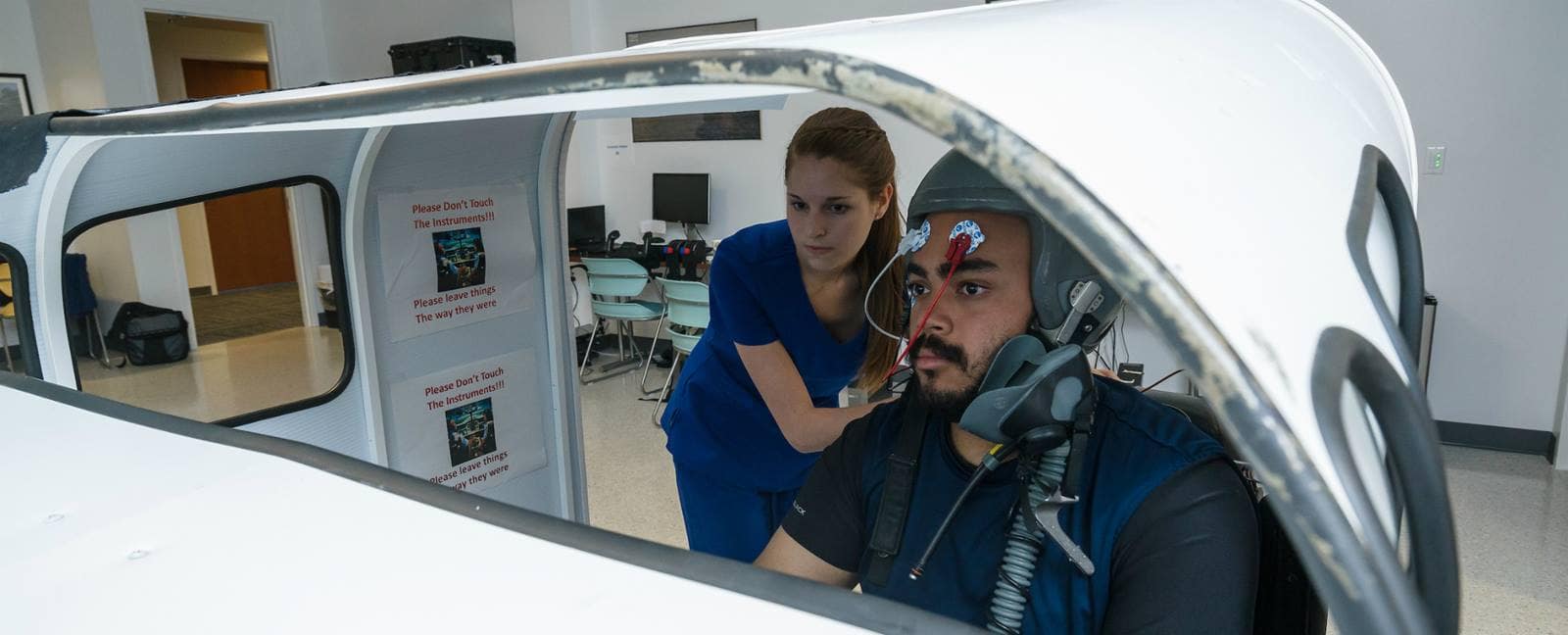
Ph.D. in
Human Factors
This program provides a robust skill set for research development and data analysis and offers specializations in three areas to prepare candidates for research careers.
With technological advances in manufacturing and production comes the need for more efficient human-machine interactions. It is human factors professionals who will ensure efficiency and safety in the design of systems and machines of the future.
The Ph.D. in Human Factors at Embry-Riddle is focused on advanced techniques in research with a highly quantitative focus. Embry-Riddle is the only university in the United States to offer undergraduate, graduate, and post-graduate programs in Human Factors, which attracts external funded research opportunities.
The department offers broad research opportunities with an emphasis on quality applied research. It specializes in human performance research and is proud of its reputation for successfully completing challenging projects.
At ERAU, students in the Human Factors program learn amid industry experts and gain access to a wide variety of training facilities capable of supporting research program objectives.
ERAU Labs and Facilities include two flight simulators that emulate technically advanced aircraft, simulation of unmanned aerial systems, team performance lab, physiology and color vision lab, and a motion sickness lab.
The availability of ongoing projects and research across the campus provides students with opportunity for collaborative engagement.
With the skills Human Factors graduates possess, it’s easy to move across disciplines. Graduates can look forward to careers in academia, private industry, government, or the military.
DETAILS
About Human Factors at the Daytona Beach, FL Campus
The objective of this Ph.D. program is to provide highly-qualified students an opportunity to complete a rigorous program in Human Factors, equipping students with advanced knowledge, skills, and techniques in research that are relevant to Human Factors.
The emphasis in the curriculum is highly quantitative in nature, providing these students with a robust skill set for research development and data analysis. The program focuses on core educational elements of the discipline including sensation, perception, cognition and statistics, with specializations offered in three key research areas:
- Aviation/aerospace human factors
- Medical human factors
- Technology-enhanced learning and testing
The Ph.D. in Human Factors degree is housed in the Department of Human Factors and Behavioral Neurobiology of the College of Arts and Sciences.
The program is open to students who have earned a bachelor's or master’s degree in Human Factors, Psychology, or other closely-related fields. These students will have an exemplary academic record, will have demonstrated independent research skills, and wish to pursue research positions in academics, government, or industry when they graduate.
Students have access to labs and facilities at the Daytona Campus dedicated to aerospace and aviation, including the unmanned aircraft systems simulation, team performance lab, physiology and color vision lab, and the motion sickness lab.
Student Learning Outcomes
Students will:
- Have knowledge in seven key areas: human factors, sensation/perception, memory/cognition, research methods, statistics, ergonomics, and usability.
- Perform independent research to add to the body of knowledge in the field of human factors.
- Disseminate their research through presentation and publication.
- Be employed in either industry, government, or academic institutions.
Degree Requirements
The degree in Human Factors will be conferred in recognition of academic accomplishment and demonstrated ability to conduct innovative scientific research independently. A minimum of 84 credit hours of coursework beyond the bachelor’s degree, or a minimum of 48 credit hours of coursework beyond a Master’s degree is required for the Ph.D. in Human Factors. All courses must be graduate level and must be approved by the student’s advisor prior to registration.
Each Ph.D. student must pass the qualifying exam within one year after he/she has completed the required Master's level course work or three years after entry, in order to achieve Ph.D. candidacy. The Graduate Program Committee will invite eligible students to sit for the qualifying exam. Only students who are in good standing, and who have been identified through their individual work with a faculty member as qualified to enter into Ph.D. candidacy, will be allowed to take the qualifying examination. A student who fails to pass the qualifying exam will be dismissed from the Ph.D. program.
A minimum of 30 credit hours of dissertation research must be completed after passing the qualifying exam. A dissertation proposal must be developed and the student must defend his/her dissertation proposal within one year after completing the qualifying examination. Prior to the defense of the dissertation proposal, a dissertation committee will be formed, as required by the university. The Award of the Ph.D. is based on the submission of a satisfactory dissertation, approved by the dissertation committee.
Further information about dissertation requirements can be found under Ph.D. Regulations and Procedures.
Core Requirements
| Quantitative Core Courses | ||
| HFS 510 | Research Design and Analysis I | 3 |
| HFS 511 | Research Design and Analysis II | 3 |
| HFS 675 | Multivariate Statistics: Factor Analysis and Data Reduction | 3 |
| Human Factors Core Courses | ||
| HFS 501 | Human Factors in Systems | 3 |
| HFS 515 | Ergonomics | 3 |
| HFS 612 | Human Factors Methods | 3 |
| HFS 615 | Sensation and Perception | 3 |
| HFS 620 | Memory and Cognition | 3 |
| HFS 635 | Human-Computer Interaction | 3 |
| Total Credits | 27 | |
Human Factors Specified and Open Electives
| Human Factors Specified and Open Electives | 24 | |
HFS 500 | Systems Concepts, Theory, and Tools | |
HFS 501 | Human Factors in Systems | |
HFS 510 | Research Design and Analysis I | |
HFS 511 | Research Design and Analysis II | |
HFS 515 | Ergonomics | |
HFS 520 | Team Performance | |
HFS 521 | Modeling Humans in Complex Systems | |
HFS 525 | Human and Social/Organizational Factors in Emerging Technologies | |
HFS 526 | Aerospace Physiology | |
HFS 527 | Psychopharmacology | |
HFS 590 | Graduate Seminar | |
HFS 612 | Human Factors Methods | |
HFS 614 | Human Factors in Medicine | |
HFS 615 | Sensation and Perception | |
HFS 616 | Human Factors of Transportation | |
HFS 618 | HF in Aging: Behavioral and Biological Foundations | |
HFS 620 | Memory and Cognition | |
HFS 622 | Human Factors in Entertainment Systems | |
HFS 624 | User Experience | |
HFS 625 | Applied Testing and Selection | |
HFS 626 | Human Factors Principles of Visual Communication | |
HFS 630 | Applied Cognitive Science | |
HFS 637 | Managing Human Errors in Complex Systems | |
HFS 640 | Aviation/Aerospace Psychology | |
HFS 650 | Human Factors of Aviation/Aerospace Applications | |
HFS 680 | Graduate Seminar: Current Applications in Human Factors | |
HFS 690 | Graduate Student Capstone | |
HFS 696 | Graduate Internship in Human Factors and Systems | |
HFS 699 Special Topics in Human Factors and Systems | ||
HFS 700 | Thesis | |
HFS 705 | Small N Designs and Non-Parametric Analysis | |
| Total Credits | 24 | |
Dissertation
| HFS 800 | 30 | |
| HFS 715 | Supervised Teaching Experience | 3 |
| Total Credits | 33 | |
| Total Degree Credits | 84 | |
Other graduate courses may be available, but must be approved by the Graduate Program Coordinator.
Get Started Now:
Summary
48 Credits
Estimate your tuition by using the Tuition Calculator
View Financial Aid Information
Learn about our General Education
Find out about transferring credits to this degree
Learn more about our Veterans & Military benefits
View our Academic Calendar

